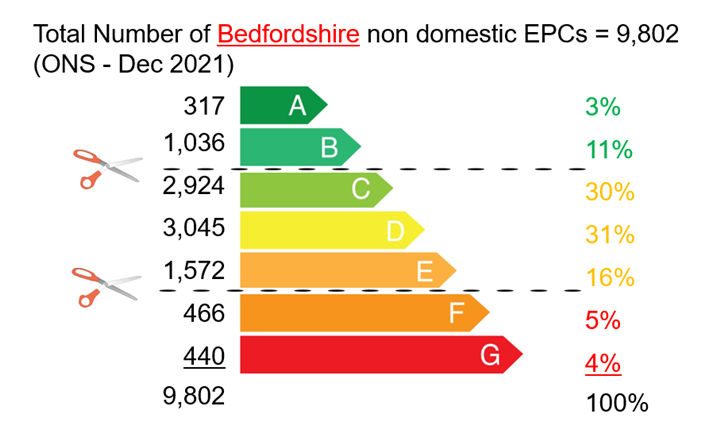Tag: commercial property
Land and Property Professionals
We sell, rent, manage, survey, plan and advise...what can we do for you?
We sell, rent, manage, survey, plan and advise...what can we do for you?

Everyone will be aware how recent world events have played havoc with energy prices. It’s a shame that it’s taken such a rapid increase in costs to finally bring such a vital matter to everyone’s attention but conserving energy has never been so important.
We are urging all non-domestic property owners to check their current Energy Performance Certificate (EPC) straight away as this will provide an initial guide as to how efficient their property is. Whether you are a property owner or occupier, reducing how much energy we need to heat our properties has the potential to save a lot of money. Energy costs are still spiraling so if you do have a poor EPC rating, considering retrofitting or renovation is vital.

We can advise you on how to improve your property. If your property is vacant or you are considering changes, this often provides the perfect opportunity to make alterations now to conserve energy and enable you to improve the EPC rating.
Heritage buildings often have inherent restrictions that make it more difficult to make sustainability minded improvements. They can often bring challenges, however we also have the expertise to advise on the most suitable works for listed buildings.
Potential improvements can come in an array of options; everything from upgrading lighting and heating controls, to major physical works to upgrade the external insulated envelope. Although some options may be expensive, we believe they should be seen as an opportunity to enhance the energy efficiency of the lifecycle of the building. Yes, there may be significant costs involved, however you should see this as a chance to make improvements to extend the long-term value of the building.

Government legislation now states it is unlawful to grant a new tenancy or extend an existing lease for a property with an EPC rating of F or G. There will be financial penalties for not complying with the legislation, therefore we recommend you carry out some simple checks sooner rather than later.
The legislation will also extend to all existing commercial leases from April 2023. So even if you think the regulations do not affect you straight away, it is essential you properly plan to ensure you can continue to let your property in the future.
If you need some assistance reviewing your EPC then please get in touch and we can help you. Act today and it may save you time, aggravation and a lot of money.
For more information or to find out how our Architecture & Building Surveying department can help you please contact Robert Franklin.

Allow yourself five minutes to check your Energy Performance Certificate (EPC) today and it may save you time, aggravation and a lot of money in a few months’ time.
Government legislation now states it is unlawful to grant a new tenancy or extend an existing lease for a property with an EPC rating of F or G. There will be financial penalties for not complying with the legislation, therefore we recommend landlords carry out some simple checks sooner rather than later.
The legislation will also extend to all existing commercial leases from April 2023. So even if you think the regulations do not affect you straight away, it is essential you properly plan to ensure you can continue to let your property in the future.

Figures from the Office for National Statistics (ONS) highlight that 9% of non-domestic properties in Bedfordshire are in the danger zone of an F or G rating. These figures are fairly typical across the whole country so ask yourself the question – is your building one of them?
Energy Efficiency

EPCs were introduced in 2008 but only have a 10-year lifespan before they need renewing. You will therefore need to consider the following:

Looking further ahead
It doesn’t stop at F and G rated properties. The Government is currently consulting on bringing in tighter legislation by 2030. They are consulting on whether to make it unlawful to let a commercial property with an EPC rating below a C, or possibly even a B. It is worth bearing this in mind and to get the right advice and plan ahead now.
Risks
In addition to the fines imposed on poorly rated F and G properties, the following is affected:
We can help
It is the landlord’s responsibility to ensure their property has a valid EPC. However, many will be unaware of what their current EPC rating actually is. Although the regulations appear to be another burden for the landlord, we believe they should be seen as an opportunity to enhance the energy efficiency of their properties. Yes, there may be costs involved, however you should see this as a chance to make improvements to extend the long-term value of the building.
For further information about how we can help you improve your EPC, please contact Robert Franklin.

There are a wide range of benefits when using a commercial property agent, such as Robinson & Hall, to assist you with the disposal of a property, by lease or sale, or when acquiring a property, either as a purchaser or a tenant. We have detailed a number of these key advantages below.

We offer a no obligation market appraisal where we will visit the property and then provide advice to you on the best methods of marketing the property, timing and the potential sale price or rent.
Once you have decided to sell/let your property we will advise on what pre-marketing works need to be completed to maximise the value and how to set a property up for marketing, We will assist with taking photos of the property to present it in the best light and prepare a professional and detailed set of marketing particulars. All of this helps to ensure you get the best out of your sale/letting.
These include advice on:
Our properties are marketed on a variety of online property portals which increases the property’s exposure to interested parties.
We send properties to suitable applicants on our database. Sometimes this means we can find a buyer/tenant prior to launching the property to the open market.
We carry out reference checks on all tenants to ensure their financial position will enable them to cover the rent.

As well as assisting in the sale or letting of commercial properties we also regularly carry out property searches for those looking to purchase or rent a property. The benefit of using an agent in these instances are as follows:

For more information or to find out how our Commercial Property Services department can help you please contact Tessa Smith.
More changes are on their way regarding the Minimum Energy Efficiency Standards (MEES) for commercial properties in the UK.

Energy efficiency is at the forefront of everyone’s minds at the moment. The Government has committed to reduce carbon emissions by 2030 and the message is clear that change is definitely on its way. We are unlikely to see any further significant delays to the proposed legislation as a result of the recent pandemic, therefore action is needed sooner rather than later.
Current position
The current position regarding MEES, which has been in place since 1st April 2018, is that it is unlawful for a landlord to grant a new tenancy of a commercial property with an EPC rating of lower than E (unless an exemption applies).
1st April 2023 – minimum EPC rating of E for all existing leases

The important fact that all commercial landlords need to be aware of is that from 1st April 2023, this same rule will apply to all existing leases. This means that subject to limited exemptions, it will soon be unlawful for a landlord to continue to let a commercial property with an EPC rating of less than E.
The time to consider your current portfolio is now.
Government to increase EPC rating to B
The Government continues to review the legislation and has recently consulted on proposals to increase the MEES target for all commercial property even further to a minimum EPC rating of B by 2030.
In addition, a landlord of a rented property will need to have an EPC at all times. At the moment, a property is only in the scope of the MEES regulations if there is a valid EPC in place. This has created a loophole for properties that do not currently have a valid EPC, i.e. an existing EPC has not been renewed after 10 years. However, this loophole will soon be closed. We will know more information when further guidance is issued at the end of 2021.
Further issues to consider

Under the relevant regulations, it is the landlord’s responsibility to comply with MEES and all costs currently fall on them. However, an occupier will not be able to sub-let unless they can demonstrate they comply under the MEES regulations.
Certain exemptions are already in place and we can advise you whether your property falls within one of these categories. It is proposed that a new central database of compliance and enforcement be set up where landlords will submit their compliant EPCs or details of any exemptions. Any exemption will need to be reviewed every 5 years to ensure it remains valid under the regulations.

A clarification has been provided that a listed building should have an EPC but will be able to apply for an exemption if the MEES standard cannot be practically achieved, i.e. by virtue of such works being incompatible with planning or listed building criteria.
The perils of obtaining an accurate EPC are well documented in previous articles on our website. Needless to say, if the Government continues to place so much emphasis on EPCs then it is imperative you obtain the correct advice and an accurate EPC.
Non-compliance brings the risk of high financial penalties. There may not have been many high profile examples, however this is about to change. Bedford Borough Council has recently announced it intends to clamp down on domestic landlords who continue to ignore the legislation. Other local authorities will follow suit and also include commercial properties, as they see this as an easy way of raising revenue. So you have been warned.
How can we help?
We can help you make your properties more energy efficient. Whether it’s improving insulation, lighting or heating, we can guide you through all the regulations and ensure you futureproof your assets. If you’re considering refurbishing or converting a property, please include us at an early stage as many of these aspects can easily be designed and incorporated in your building works and trying to do them retrospectively can be expensive and indifferent.
Any changes you consider will make your property more attractive to potential tenants and should ultimately make it easier to let at a higher rent.
Regardless of the Government’s final response to the consultation, it is clear change is on its way. Be prepared and start planning now.
If you require more information or would like to discuss how we can help make your property more energy efficient, please contact Robert.

2020 was a year of uncertainty which impacted on business growth, strategy and vision for the future for many but this certainly was not felt or seen in the commercial property market.
2020 commercial market
2020 forced a number of companies to adapt and change their business model and their way of working.
Which area excelled?
One of the areas of accelerated growth has been in the E-commerce market, particularly in retailing. It is no surprise that due to COVID, this area of business is more important than ever as a huge amount of people now rely upon online shopping. This resulted in a significant uplift in demand for warehouse property, where the market was already robust prior to the pandemic.
What were enquiry levels like?
There was no period throughout the whole of last year where we saw a decline in enquiries for industrial or warehouse properties.
What are tenants looking for?
Enquiries were particularly strong for units located in rural areas away from built up urban environments. Potential tenants are drawn to units located on existing farms because they like the accessibility, good parking ratio, range of unit sizes, on-site security, and flexibility, that can usually be offered, allied to location.
What is key?
Unit size is key. The majority of tenants are looking for smaller units up to 3,000 sq ft.
Established urban industrial and warehouse units tend to be larger and, in addition to higher base rents and business rates, they can also attract service charge contributions.
Robinson & Hall commercial lettings

During 2020, Robinson & Hall’s commercial department let a range of industrial and warehouse units across Buckinghamshire, Bedfordshire, Cambridgeshire and Hertfordshire.
In particular, we let two developments of newly converted farm buildings for commercial purposes. These were both in the close vicinity of Milton Keynes and Cambridge and were highly popular, letting very quickly with a good range of enquiries to select from. The units were of a range of sizes up to 3,000 sq ft and the demand outweighed the supply at both locations.
2021…
Moving into 2021, we have seen the demand and number of enquiries continue to grow.
Please contact the commercial property team to organise a no obligation, free market appraisal on 01234 351000 or email tms@robinsonandhall.co.uk

As a result of the COVID pandemic, the commercial property market is clearly going through a turbulent time. Across many regions there is an increasing amount of empty commercial space which is underutilised or waiting to be re-let.
So, what are your options if you are a landlord of an empty premises and feel you may struggle to find a new tenant?
You may decide to:
Whichever path you choose to take, one important thing is to consider that Government legislation now states it is unlawful to grant a new tenancy or extend an existing lease for a property with an Energy Performance Certificate (EPC) rating of F or G. There will be financial penalties for not complying with the legislation, therefore we recommend landlords carry out some simple checks.
If your property is empty, this may provide the ideal opportunity to carry out repair works to enhance the value of your assets and improve the energy efficiency.
Not just a tick box anymore
Checking your current EPC also highlights many issues to consider. Some historical EPCs have been found to contain inaccurate information which has contributed to properties having a poor energy rating. In the past, EPCs were seen by many as a ‘tick box’ exercise just to advertise the property on the open market and enable a lease to be signed. Many were obtained as economically as possible with little attention to detail and based upon wrong assumptions. This has left many properties vulnerable and dropped them unnecessarily into the danger zone.
EPCs were introduced in 2008 but only have a 10-year lifespan before they need renewing.
Who would have realised back then how EPCs would evolve and the importance they would play today?
Can you trust your current EPC?

How many landlords know if existing tenants have made any changes since the last EPC? Changes to service installations, including poorly performing air conditioning or inefficient electric heaters, can dramatically reduce the rating. We strongly urge landlords to review their current documents and, if necessary, commission new EPCs to ensure they accurately reflect the property.
Time is running out
The legislation will also apply to all existing commercial leases from April 2023. So even if you think the regulations do not affect you straight away, it is essential you properly plan to ensure you can continue to let your property in the future.
Looking further ahead
Given the Government’s recent announcement to support the UK’s net zero carbon target by 2050, the Government is currently consulting on bringing in tighter legislation by 2030. They are consulting on whether to make it unlawful to let a commercial property with an EPC rating below a C, or possibly even a B. It is worth bearing this in mind when reviewing your property management strategy.
Risks
It is already affecting valuations as many financial institutions are refusing to lend against sub-standard properties with an inefficient energy rating. Rent reviews may also be affected as tenants realise how uneconomical their building is to occupy. It is the landlord’s responsibility to ensure their property has a valid EPC, however many will be unaware of what their current EPC rating actually is. National figures suggest that up to a fifth of all non-domestic properties in England and Wales could be in the danger zone of F and G.
We can help
Property owners who find themselves in this situation with an empty, or soon to be empty, property would do well therefore to start to consider issues arising from the EPC rating of a property.
Although the regulations appear another burden for the landlord, I believe they should be seen as an opportunity to enhance the energy efficiency of their properties. Yes, there may be costs involved, however see this as a chance to make improvements to extend the long-term value of the building.
There are numerous exemptions and some of the legislation is complicated to navigate through. Robinson & Hall can help identify any buildings at risk, assess your property, implement a strategy to ensure your buildings comply with the regulations and advise upon the most cost-effective options. As well as energy efficiency, we can also assess whether you may be able to take advantage of the current permitted development legislation or potential development options.
For further information about how we can help you improve your EPC, please contact Robert Franklin on 01234 362917 / 07976 256586 or email rjf@robinsonandhall.co.uk.